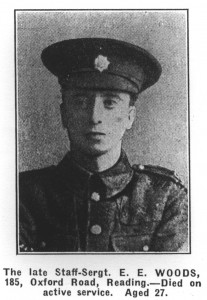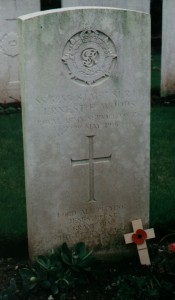Ernest Edward Woods
Staff Sergeant SS/5255
attached to 37th Division H.Q. Army Service Corps.
Division 80
 |
 |
Ernest Edward Woods was the son of Thomas and Susannah Woods, of 185, Oxford Road at the time of their son’s death; and 23, Coley Hill, Reading at the time of CWGC registration. His name is commemorated on the headstone of grave number 16890. He died on 22nd May 1916 and is buried in Doullens Communal Cemetery Extension II.C.18.
The Standard 29th July 1916 gives details of his career and the details of the illness which killed him.
“ Sergt. Woods enlisted directly the war broke out, prior to which time he was a journalist on the ‘West London Free Press,’ which makes the following comment on his death:- “Woods was a capable and strenuous journalist. His qualities of sprightly energy, alertness and loyalty won him the sincere regard of our staff. His death appears all the more tragic because it was so unexpected. Shortly before he was taken ill he wrote to his mother saying he was quite well and ever so happy. Further information showed, however, that the preliminary cause of death was a tumour on the brain. He was an extremely bright and joyous fellow, and had he lived would have had an honourable career in the Army. Already he had won the confidence of the officers’ and men, and at headquarters it was known that he was marked out for rapid promotion. For his mother and other relatives the sympathy of all who knew Staff Sergt. Woods goes out.”
The C.O. wrote: “Woods had been in my confidential clerk for over a year – ever since the formation of the division. It may be of some satisfaction to you to know that your son did his duty both willingly and well. He died practically in the front line.”
Doullens was the H.Q. of the French General Foch in the early part of the war. From Summer 1915 to March 1916, the town was the junction between the French 10th Army and the British Third Army on the Somme. The Citadelle, overlooking the town from the south, was a French military hospital, and the railhead was used by both Armies. In March 1916, the Arras front became British, and the town became home to various Casualty Clearing Stations. Medical units buried their dead firstly in the French Extension of the Communal Cemetery and later Extension No.2 when casualties form both the Arras and Somme fronts increased.